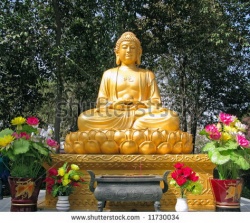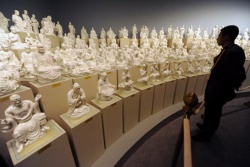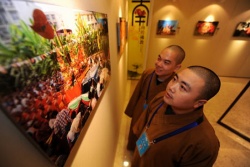Difference between revisions of "Religion in China"
m (Text replacement - "ten" to "ten") |
m (1 revision: Robo text replace 30 sept) |
(No difference)
| |
Latest revision as of 14:31, 30 September 2013
Introduction
Religious observance in China is on the rise. According to a survey published in a state-run newspaper, 31.4 percent of Chinese adults are religious, a figure that is three times the initial government estimate. The Chinese Communist Party (CCP) is officially atheist, but it has been growing more tolerant of religious activity for the past twenty years. China's constitution explicitly allows "freedom of religious belief," and in 2005, the State Council passed new guidelines broadening legal rights for state-sanctioned groups. In March, U.S. Secretary of State Condoleezza Rice recognized these efforts and removed China from the State Department's list of top human rights violators. But experts say that Muslim Uighurs, Buddhist Tibetans, unregistered Christians, and groups that the party brands as cults, such as Falun Gong, are still persecuted and repressed.
Freedom and Regulation
Article 36 of the Chinese constitution says that Chinese citizens "enjoy freedom of religious belief." It bans discrimination based on religion, and it forbids state organs, public organizations, or individuals from compelling citizens to believe in—or not to believe in—any particular faith. In 2005, the State Council passed new Regulations on Religious Affairs, which allow religious organizations to possess property, publish literature, train and approve clergy, and collect donations as long as they have registered with the state. According to Chinese criminal law, officials who deny citizens of their right to religious belief can be sentenced up to two years in prison.
But religious freedom is still not universal in China. The state only recognizes five official religions—Buddhism, Taoism, Islam, Catholicism, and Protestantism—and considers the practice of any other faith illegal. Religious organizations are required to register with one of five state-sanctioned patriotic religious associations, each of which is supervised by the State Administration for Religious Affairs (SARA). Religious groups that fail to affiliate with one of the five official religions are denied legal protection under Chinese law.
In 2007, two professors of Shanghai-based East China Normal University polled 4,500 people about their religious belief. Their findings, which were published in the state-run China Daily, said that the five official religions account for 67.4 percent of religious adherents in China. Many of the unregistered believers were said to worship legendary figures such as the Dragon King or God of Fortune. According to a report from the U.S. State Department, groups that the Chinese government classifies as "cults" (such as the Falun Gong, Zhong Gong, and a variety of Christian sects) account for many of the unregistered believers as well.
Public security officials monitor both registered and unregistered groups to prevent them from disrupting public order, impairing the health of citizens, or interfering with the state's education system. Some experts say that SARA uses these legal loopholes to curb religious freedom throughout the country. "The fine print matters," says Andrew J. Nathan, former chair of the advisory committee of Human Rights Watch, Asia. He notes that SARA denies legal protection for groups it deems "subject to foreign domination," as well as groups whose activities fail to classify as "normal." These legal ambiguities give SARA the flexibility to decide which religious groups can get state approval.
The Atheist CCP
The CCP is officially atheist, in accordance with its Marxist roots. According to the U.S. State Department, the party has issued circulars ordering party members not to hold religious beliefs, and it has demanded the expulsion of party members who belong to religious organizations. CCP officials have said that party membership and religious beliefs are incompatible, and they discourage the family of CCP members from publicly participating in religious ceremonies.
But despite official orders that cadres be atheist, some members of the CCP manage to juggle their faith with their party membership. "In most cases, ordinary Chinese do enjoy the ability to privately and quietly practice the faith that they profess," says Scott W. Harold of the Center for Peace and Security Studies at Georgetown University. Adam Segal, CFR senior fellow for China studies, agrees, adding, "If you're a party member and you practice religion through a state-sanctioned way, it would not necessarily be a problem." According to a profile of the CCP from GlobalSecurity.org, up to 25 percent of party officials in some localities engage in some kind of religious activity.
Christian House Churches
Since the 1980s, there has been a significant growth in Christianity throughout China. But many Christians choose not to register with the state. "Some groups don't want to accept the official doctrine," says Nathan, noting that the state-sanctioned form of Christianity is considered too liberal by many adherents in the countryside. Some Catholics practice off the record because the state forbids them from pledging allegiance to any foreign figure, including the Pope. Pope Benedict XVI has said he would like to restore diplomatic relations with China, which were cut off in 1951 after the Communists came to Power. But a dispute over the Vatican's right to appoint bishops has prevented progress.
Harold adds that the state limits the number of people who can join each church, so some Christians who want to join the state-sanctioned church find that they cannot do so legally. These regulations have prompted the creation of a sizeable underground Christian community. It is hard to estimate the number of Christians who practice without state sanction, but the Pew Research Center reports that the number is probably between 50 and 70 million. Many of these Christians hold services in "house churches," which are private religious forums that adherents create in their own homes. SARA allows friends and family to hold informal prayer meetings without registering with the government, so these makeshift house churches have more theological freedom than state-sanctioned churches.
House churches, like official churches, are often besieged by the state. According to a report (PDF) from the China Aid Association, Chinese officials harassed house churches in at least sixty cases last year, resulting in 788 arrests and 693 detentions. But experts say the CCP is growing more tolerant of these covert religious forums. In March 2008, Open Doors International, a Christian religious freedoms group, endorsed the State Department's decision to remove China from its human rights blacklist because "religious freedom in China, compared to five, ten years ago, is in much better shape now."
Islam and Uighurs in Xinjiang
According to China's latest census, which was conducted in 2000, there are over 20 million Muslims in China. The country has ten predominantly Muslim ethnic groups, the largest of which is the Hui, an ethnic group closely related to the majority Han group. Ranking next to the Hui are the Uighurs, a Turkic people who live primarily in the autonomous region of Xinjiang province in northwest China. According to the U.S. State Department, officials in Xinjiang tightly control religious activity, though Muslims in the rest of the country enjoy greater religious freedom.
Xinjiang is an area of special concern because of its Turkic leanings, as well as the fact that it is the base of the East Turkestan Islamic Movement (ETIM), a militant Islamic separatist group. Since 1990, China has accused the ETIM of engaging in more than two hundred terrorist attacks, though experts say the state may be exaggerating. Most Uighurs do not support the ETIM, but they are frustrated with the Chinese government because they face discrimination for having a different religion, language, and culture than the typically wealthier Han Chinese.
The CCP also worries about Xinjiang because of the region's ethnic and religious ties to neighboring states. "What Uighurs have is a very large population of ethno-linguistic and religious brethren in Central Asia, and all the way up to Turkey," says Harold. "They strongly feel that the Uighurs are treated as second-class citizens in China." He says that the state is worried about foreign influences—especially Islamic extremism—that might emanate out of Central Asia and cross into China. These concerns prompt the CCP to keep a watchful eye on religious activity in the region.
Tibetan Buddhists
There are over 5 million ethnic Tibetans in China, most of whom are Buddhist. The Dalai Lama is the spiritual leader of Tibetan Buddhists, as well as an active participant in the ongoing debate about Tibet's political status. Since 1987, he and his exiled government in India have played a key role in garnering international support for Tibetan independence. Buddhist monks within Tibet have also been active political dissidents, organizing anti-government demonstrations (which erupted into violent riots in March 2008). Experts say that demonstrations like these have convinced the CCP that Tibetan monks are the ringleaders of political dissent in the province.
In order to quell this dissent, the CCP restricts religious activity in Tibet. The state monitors daily operations of major monasteries and it reserves the right to disapprove any individual's application to take up religious orders. "Beijing's hope is that ultimately a new generation of Tibetans will emerge that will be less influenced by religion," writes Melvyn C. Goldstein, director of the Center for Research on Tibet at Case Western Reserve University, in a 1998 Foreign Affairs article. In order to shape the new generation, the CCP has created "patriotic education campaigns" that promote a state-sanctioned version of Buddhism.
Experts say that discontent amongst Tibetan Buddhists stems in part from economic disparities between ethnic Tibetans and Han Chinese. But they also stress the sincerity of Tibetans' religious grievances. "It's definitely the case in Tibet that one of the most immediate sources of frustration of those people who have been most active recently has been China's policy towards religion," says Harold. "The state attempts to vilify the Dalai Lama and force Tibetans to believe something that they do not believe: that he's evil, that he's splittist, and that Tibet has always been and will always be a part of China." Nathan agrees that there is a real religious element in the Tibetan conflict, adding, "The state has unfolded patriotic education campaigns in the monasteries, which they wouldn't do if religion didn't really matter to the Tibetans."
Falun Gong/Falun Dafa
Falun Gong (also known as Falun Dafa) is a spiritual movement that blends aspects of Taoism, Buddhism, and Qigong, which is a traditional Chinese exercise. Falun Gong practitioners say the movement has ancient origins, but it first appeared in its modern form in 1992, when group founder Li Hongzhi began teaching the exercises in Changchun, China. In 1999, the CCP outlawed the group and began an ongoing crackdown against its adherents. According to the U.S. State Department, Falun Gong practitioners continue to face arrest, detention, torture, and abuse. Practitioners who recant their beliefs are sometimes subjected to harsh treatment in prisons, reeducation through labor camps, and extrajudicial "legal education centers."
In an official statement, the CCP said it cracked down on the Falun Gong because the group was "advocating superstition," "spreading fallacies," and "hoodwinking people." But experts say the state's suppression of the Falun Gong had less to do with its doctrine than with the organizational capacity it demonstrated in April 1999. Earlier that month, Chinese physicist He Zuoxiu had criticized the Falun Gong in an article published by Tianjin Normal University. The article sparked a small protest among Falun Gong followers, which was quickly suppressed by Chinese police. Two weeks later, over ten thousand Falun Gong practitioners gathered near the headquarters of the CCP, where they conducted a silent, peaceful, and remarkably well-organized protest.
"Falun Gong was what it was for ten years without attracting a crackdown," says Nathan. "It was only after the demonstrations in 1999 that Falun Gong stood out among the Qigong groups for its organizational ability." According to Cheris Shun-ching Chan, assistant professor of sociology at the University of Pittsburgh, the Chinese government is especially wary of well-organized religious sects. "In Chinese history, anti-government rebellions almost always took the form of new religious movements," she writes in the China Quarterly, adding that semi-religious groups like the Yellow Turbans, White Lotus Sect, and the Kingdom of Heavenly Peace have all been vehicles of political revolt. Segal says that the CCP was also alarmed by the demonstration "because they didn't see it coming," which made their response all the more severe.
Looking Forward
When Chinese President Hu Jintao reiterated his party's commitment to free religious belief in October 2007, it launched a flurry of articles that said China was on a new, more liberal path. But experts do not anticipate immediate or drastic change in China's religious landscape. "There is no systemic reason for change," says Nathan, noting that the government has no incentive to give up control of the authorized or unauthorized groups. Segal is also skeptical, saying, "It would have to be a completely different kind of political environment" for truly independent churches and religious groups to emerge. But Harold holds out more hope for the future, suggesting that China's growing middle class might prompt more liberal religious policies. "I think as societies become more moderately well off, social tensions begin to relax a little bit," he says, adding that the emerging middle class might resist religious repression. But he follows this claim with a disclaimer, adding, "But maybe that's a little hopeful on my part."


